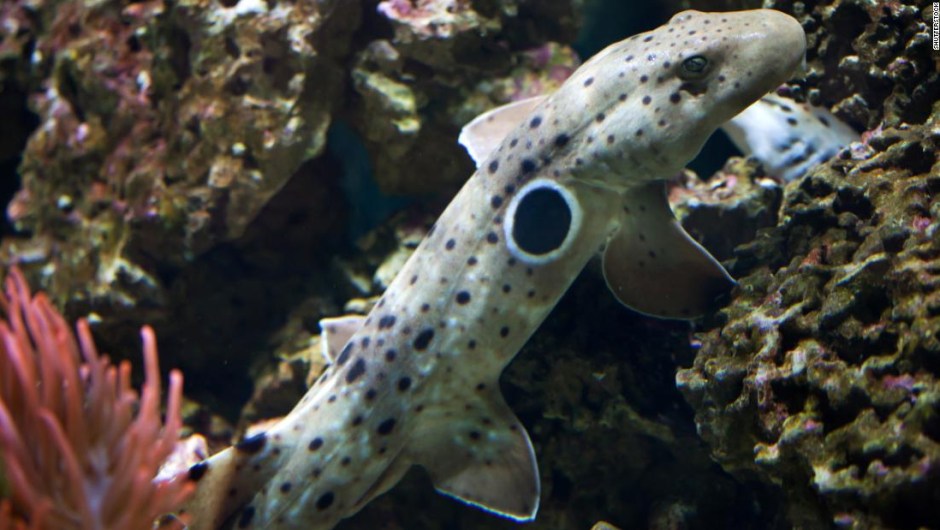Photograph of the epaulette shark (Hemiscyllium ocellatum)
(CNN) -
Baby sharks are born smaller, malnourished and exhausted as climate change warms the world's oceans, researchers say.
Researchers examined the effects of rising temperatures on the growth, development and physiology of epaulet sharks of the Great Barrier Reef, testing embryos and hatchlings in waters up to 31 degrees Celsius.
The research team found that in warmer waters, shark embryos grew faster and used their yolk sac, the only food source at this stage of development, faster.
The creatures hatch earlier and are born smaller, and needed to feed immediately but lacked energy, researchers from Australia's ARC Center of Excellence for Coral Reef Studies at James Cook University and the University of Massachusetts said Tuesday.
There are more than 500 types of sharks that live around the world and most give birth to live young.
Some species of sharks, such as epaulet sharks, lay eggs, which are left unprotected and must be able to survive on their own for up to four months.
"The epaulette shark is known for its resistance to change, including ocean acidification," said Jodie Rummer, co-author and associate professor at the ARC Center of Excellence for Coral Reef Studies, in a statement.
So if this species cannot cope with warming waters, how will other less tolerant species fare? He wondered.
advertising
The Great Barrier Reef is the largest coral reef in the world.
It covers about 345,000 square meters and is home to more than 1,500 species of fish, 411 species of hard coral, and dozens of other species.
The importance of sharks for ecosystems
The last decade has been the warmest on record for global ocean temperatures.
By the end of the century, the Great Barrier Reef is likely to experience average summer temperatures near or above 31 degrees Celsius, the researchers warn.
Rummer said rising ocean temperatures could threaten sharks in the future, including egg-laying and life-giving species, because as temperatures rise, the creatures will hatch or hatch in environments they can barely tolerate. .
See the images of the impressive hammerhead shark they sighted off the coast of Florida
"The study presents a worrying future as sharks are already under threat," lead author Carolyn Wheeler said in a statement.
'Sharks are important predators that maintain healthy ocean ecosystems.
Without predators, entire ecosystems can collapse, so we must continue to study and protect these creatures, ”added Wheeler, a doctoral candidate at the ARC Center of Excellence for Coral Reef Studies.
"Our future ecosystems depend (on) us to take urgent action to limit climate change," Rummer said.
The study was published in the journal
Scientific Reports
.
The megalodon shark was cannibalistic in the womb and measured up to 2 meters at birth, according to a study
The impacts of rising temperatures on the oceans
The oceans serve as a good indicator of the real impact of climate change.
They cover almost three-quarters of the Earth's surface and absorb most of the world's heat.
Although we often cannot see it, ocean warming has a profound impact on the entire world.
A warmer ocean causes sea levels to rise, causing problems like dangerous coastal flooding.
It leads to the loss of sea ice, further warming the waters and can affect the jet stream, allowing cold Arctic air to travel further south.
This makes winters more intense and threatens animals that depend on sea ice.
A warmer ocean also contributes to increased rainfall and stronger, longer-lasting cyclones like Hurricanes Florence and Harvey.
The marine heat waves that have washed out swaths of Earth's coral reefs have likely doubled in frequency.
And they are predicted to become more common and intense, according to a 2019 report by the United Nations Intergovernmental Panel on Climate Change.
CNN's Jen Christensen, Ivana Kottasová, and Drew Kann contributed to this report.
Sharks











